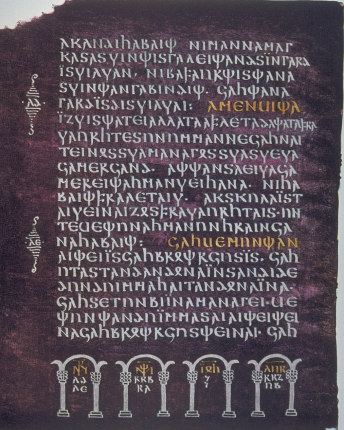After I published my book, I was chatting with fellow word enthusiast Tim Stewart, who was one of the first readers. At one point he noted that there are a lot of references to various religious texts, and he gently asked “Do you have a background in Christianity?”
It was a keen observation. Per a casual count, I mention or cite the Bible about ten times, and I have references to the Lindisfarne Gospel, the Book of Common Prayer, and the Dead Sea Scrolls. I also have a reference to the Quran.
I can see why someone might conclude that I might have studied these texts in a religious context. But no. I was raised outside of any faith. In fact, because I didn’t go to Sunday school (or equivalent) and hadn’t read any religious texts growing up, I’ve often thought that I’ve been at a disadvantage when it comes to Biblical knowledge.
 I apparently recognized this early on. When I was in high school, I took a class that was named something like “The Bible as Literature.”[1] I don’t remember much about that class, other than that I did a presentation on representations of the Madonna in art—something that seems like the type of knowledge one can have without having any religious motivation.
I apparently recognized this early on. When I was in high school, I took a class that was named something like “The Bible as Literature.”[1] I don’t remember much about that class, other than that I did a presentation on representations of the Madonna in art—something that seems like the type of knowledge one can have without having any religious motivation.
Such Biblical learning as I have came about more indirectly, when I got to university and started studying old languages. Literacy, hence written materials, for old languages often coincided with the Christianization of the people who spoke (wrote) those languages. A particularly salient case (one that I wrote about elsewhere) is that of the Gothic language: effectively, the only real text in that defunct language consists of fragments of a Bible translation.
 In fact, it was a class in Gothic that sort of kickstarted my Bible-reading. Most old-language classes consist of studying grammar and then reading texts. Exams in those classes then usually consist of being given a passage and having to translate it.
In fact, it was a class in Gothic that sort of kickstarted my Bible-reading. Most old-language classes consist of studying grammar and then reading texts. Exams in those classes then usually consist of being given a passage and having to translate it.
I remember our first midterm exam in Gothic. The prof handed out the text to translate, and someone in class muttered (or perhaps even shouted) "The Parable of the Talents!" It clearly was helpful to that student to know the outlines of the text already. But because I was so ill-read in the Bible, this clue did me no good at all.
This was decades before the internet, so we had to look everything up in books. Consequently, the next day I went to the university bookstore and got myself a pocket edition of the King James Version (KJV) of the Bible, which I carried around in my backpack for the next couple of years.
There are of course many translations of the Bible into English, but the KJV was useful to me for two reasons. One was simply that I had a new(-ish) English version of things like the Parable of the Talents in English. But it was also useful because its antique-ier grammar often reflected more closely the grammar of the dead-language texts that we were reading.
As I’ve mentioned elsewhere, I’m taking a class in Old English right now, and it has again been helpful to have some knowledge of the Bible. Although there is a pretty good corpus of Anglo-Saxon writing, there’s still a lot of Biblical themes. In fact, in our class I’ve already run across my old friend the Parable of the Talents, and I’ve also encountered the Old English versions of the Parable of the Ten Virgins and the Parable of the Weeds, along with a couple of other glancing references to the New Testament. In each case, I’ve found the relevant passage in the KJV (online these days) to help me decode what I’m reading.[2]
![Medieval-looking painting of the 10 virgins from the parable. In Old English: 'Syllaþ us of eowrum ele; for þam ure leohtfatu sind acwencte.' [KJV: Give us of your oil; for our lamps are gone out.]](https://www.mikepope.com/blog/images/BibleStudiesTenVirgins.png)
But the content and the language of the KJV has proved helpful not just when I want to study old languages. At one point in my education, I remember hearing that it’s not possible to read Milton without having a substantive knowledge of the Bible. I don’t particularly yearn to read Milton, but it’s true that stories from the Bible infuse our literature. So my instinct in high school to take a class in Bible as literature was a good one.
And there’s more. To borrow an idea, see if you know the source of these well-known phrases:
He gave up the ghost
There is no new thing under the sun
A man after his own heart
Don’t cast your pearls before swine
The writing on the wall
Many are called, but few are chosen
Since I’ve loaded the dice here, you won’t be surprised to learn that these are all from the Bible, specifically from the KJV.
The writer Cullen Murphy performed an exercise once in which he took these phrases and several more and sent associates out into the streets to ask people where the phrases were from. People knew the phrases, but they frequently didn’t know the source, although he got a lot of amusingly incorrect guesses.
The language of the KJV has resonated with English speakers for centuries, obviously, as evidenced by how much of it we’ve incorporated into our daily speech. Dozens (hundreds?) of phrases we use all the time were crafted by “certain learned men”[3] in the creation of what in 1611 was known as the Authorized Version.
Tim Stewart, my correspondent in this discussion about the Bible, put it all this way:
On one level [the KJV] is a religious text, of course, but it's also a cultural touchstone. As random data points, in both the movies Day After Tomorrow (2004) and V for Vendetta (2005), there are nonreligious characters who have short scenes where they appreciate and nearly reverence the King James as a piece of literature and an artifact of human civilization. The King James Bible continues to attract interest and spark joy not merely for its religious content but for its enduring textual and linguistic beauty, not even to mention the way its phrases and its phraseology have insinuated themselves into 400 years of English-language literature.
As I say, Tim’s question about my faith was not an unreasonable one—as I glance through my book, it does at times seem to be a bit heavy on the citations from religious sources. But the answer really is that my dabbling in old languages has inevitably familiarized me with various religiously themed texts.
And more generally, of course, I'm an English speaker. So I’m heir to the richness that the KJV and the Bible in general has contributed to our language and culture.
__________